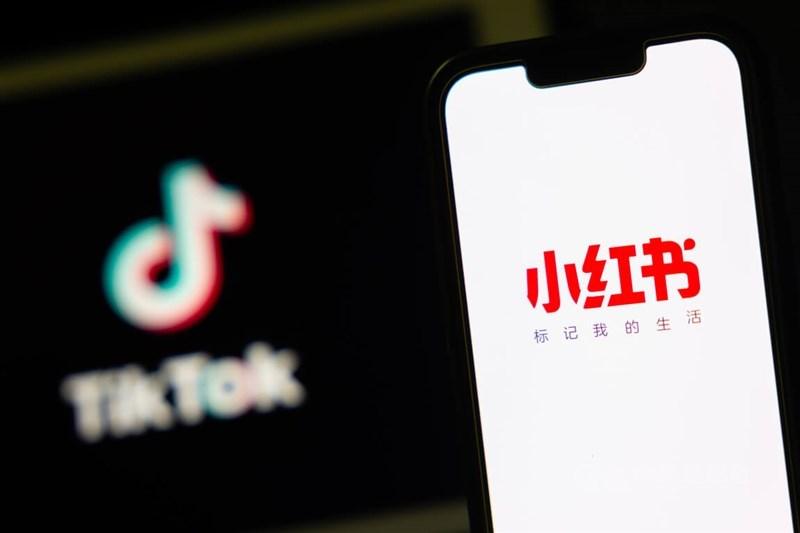There are growing suspicions that Chinese social media apps like Douyin, the Chinese version of TikTok, and Xiaohongshu, also known as RedNote, are being used by China in its united front propaganda efforts against Taiwan, Mainland Affairs Council (MAC) Minister Chiu Chui-cheng (邱垂正) said today.
During a legislative hearing, Chiu said that content promoting unification, advocating military force against Taiwan and undermining its sovereignty had been found on the two popular Chinese apps.
Chiu said he hopes Taiwan's Internet regulatory agencies would investigate the matter and address public concerns about such apps.

Photo: CNA
He was responding to a question by Democratic Progressive Party (DPP) Legislator Huang Jie (黃捷) on whether the MAC classifies social media platforms like Xiaohongshu as tools in China's united front propaganda efforts.
Huang called attention to a recent comment by Chinese academic Zhang Weiwei (張維為) that social media platforms like Xiaohongshu have become increasingly popular among young people in Taiwan, thereby advancing China's influence.
"After Taiwan is unified [with China], governing Taiwan would be easier than governing Hong Kong," Zhang said during a recent speech at China's Wuhan University.
Commenting on the speech, Chiu said in today's hearing that it was the first open statement by a Chinese scholar linking the use of popular Chinese social media apps in Taiwan to China's goal of unification.
It indicates that apps like Douyin and Xiaohongshu might be part of China's preparations for unification with Taiwan, Chiu said. Under such circumstances, the Taiwanese public may need to be more vigilant, he added.
Chiu also suggested that Taiwan's schools should start providing social media literacy guidance and education regarding the use of such apps, so that students at all levels can understand the potential risks.
For example, personal information could be used by China and incorporated into the content on those apps to promote unification ideology, he said.
Chiu today also faced other questions about the China issue, when a reporter asked about the potential risks associated with a planned visit to China by Taiwanese Internet celebrity Holger Chen (陳之漢) as a "peace ambassador."
In response, Chiu said that as an ordinary citizen, Chen does not need government approval to travel to China, under Taiwan's current regulations.
Chiu said, however, that he hopes if Chen makes the visit, he would uphold the principles of mutual respect and dignity, abide by Taiwan's regulations and strive to safeguard the overall interests of his country.

The manufacture of the remaining 28 M1A2T Abrams tanks Taiwan purchased from the US has recently been completed, and they are expected to be delivered within the next one to two months, a source said yesterday. The Ministry of National Defense is arranging cargo ships to transport the tanks to Taiwan as soon as possible, said the source, who is familiar with the matter. The estimated arrival time ranges from late this month to early next month, the source said. The 28 Abrams tanks make up the third and final batch of a total of 108 tanks, valued at about NT$40.5 billion

Two Taiwanese prosecutors were questioned by Chinese security personnel at their hotel during a trip to China’s Henan Province this month, the Mainland Affairs Council (MAC) said yesterday. The officers had personal information on the prosecutors, including “when they were assigned to their posts, their work locations and job titles,” MAC Deputy Minister and spokesman Liang Wen-chieh (梁文傑) said. On top of asking about their agencies and positions, the officers also questioned the prosecutors about the Cross-Strait Joint Crime-Fighting and Judicial Mutual Assistance Agreement, a pact that serves as the framework for Taiwan-China cooperation on combating crime and providing judicial assistance, Liang

A group from the Taiwanese Designers in Australia association yesterday represented Taiwan at the Midsumma Pride March in Melbourne. The march, held in the St. Kilda suburb, is the city’s largest LGBTQIA+ parade and the flagship event of the annual Midsumma Festival. It attracted more than 45,000 spectators who supported the 400 groups and 10,000 marchers that participated this year, the association said. Taiwanese Designers said they organized a team to march for Taiwan this year, joining politicians, government agencies, professionals and community organizations in showing support for LGBTQIA+ people and diverse communities. As the first country in Asia to legalize same-sex

MOTIVES QUESTIONED The PLA considers Xi’s policies toward Taiwan to be driven by personal considerations rather than military assessment, the Epoch Times reports Chinese President Xi Jinping’s (習近平) latest purge of the Chinese People’s Liberation Army (PLA) leadership might have been prompted by the military’s opposition to plans of invading Taiwan, the Epoch Times said. The Chinese military opposes waging war against Taiwan by a large consensus, putting it at odds with Xi’s vision, the Falun Gong-affiliated daily said in a report on Thursday, citing anonymous sources with insight into the PLA’s inner workings. The opposition is not the opinion of a few generals, but a widely shared view among the PLA cadre, the Epoch Times cited them as saying. “Chinese forces know full well that